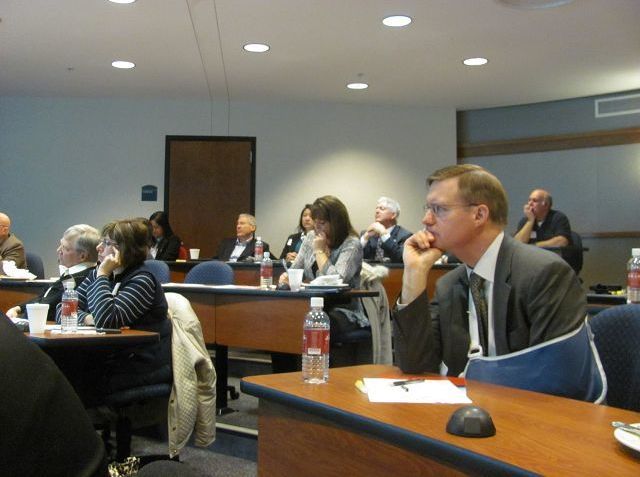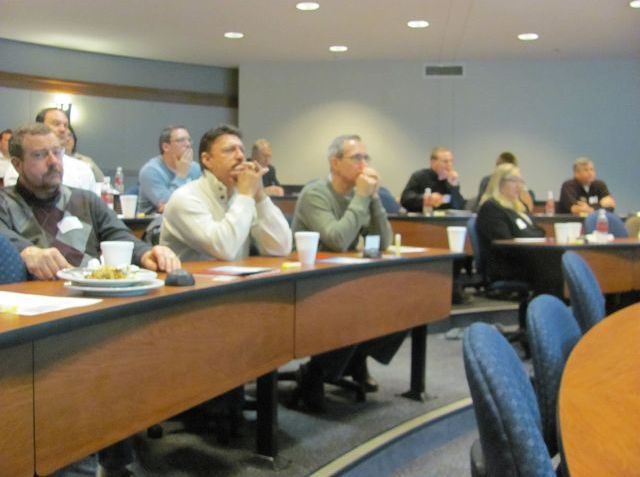Business leaders look at the year ahead in regard to global trade
Chris Weaver, president and CEO of Weaver Leather in Holmes County, was one of more than 50 business leaders who took advantage of a recent global business forecasting event featuring expert analyst Michael Weidokal and sponsored by the International Trade Association Center at Kent State Tuscarawas. Weaver, like many who attended, found the information presented to be extremely relevant to the company he is responsible for overseeing.
We do a lot of manufacturing, so for us to be able to sell our products domestically is important, but for us to be able to import and export internationally is important also. Today, to be able to learn about emerging markets, and to learn about where markets are headed from a demographic standpoint, is valuable. We do a lot of importing, so being able to understand where emerging countries are developing, to understand what the instabilities in different parts of the world are that might affect our business in exporting or importing, was great. This guy was outstanding, noted Weaver.
As to the future of China as a major manufacturer of inexpensive goods, and Weidokals prediction that those industries will move elsewhere as China becomes more affluent, Weaver said, Look at industrialization in any country, it started in the same way. It becomes more modernized, more industrialized
eventually it moves to another country (where labor is less expensive). Weaver Leather currently uses components produced in China for part of its final product, which is primarily equine and pet products such as halters, harnesses, leashes and collars.
Weaver commented that international trade helps his company grow here at home. With Michael, he presented information that was very, very relevant in a very short period of time. To get a good capture of what all is going on in the world, and in the market, in just an hour and a half, is impressive. I have not been to these types of meetings (ITAC) before, but to be able to come to this within the area is wonderful. We are trying to grow manufacturing and jobs in this area, so whatever you can do to help you expand into other parts of the world and be able to do that is helpful.
I am blessed, because I go to a lot of these. I go to Chicago, all over. I may hear three or four (business) forecasters, and Michael really ranks up there as one of the best, wherever you go, and you can get him here, right in Tuscarawas County. And a free breakfast! Michael gives you a great perspective on what is going on in the world, commented Steve Stokey, of Dovers Allied Machine. If we are going to be global competitors, we cannot stick our heads in the sand. We need to be out there, at least understanding what is going on in the world, and this is a tremendous overview. Although he said that Europe is a mature economy, they are good partners with the U.S. You can go to Europe (to trade) and get in there easier. And sometimes we forget, go to Canada. They are just three hours north, and 90 percent of their population lives within an hour of the border of the U.S., so you dont have to go that far. Canada is solid. You get paid, you get your money. You have to dip your toe in, and figure it out.
When asked if the mornings presentation revealed anything alarming or surprising for business leaders, Stokey was quick to respond.
I dont think it is alarming due to Michaels presentation, but the instability in the Middle East, nobody knows how that is going to turn out. I think the thing that was surprising to me, Id have to say, was hearing about Africa, and the amount of infrastructure that is being built. I know that when I go back to the office, and start talking about our focus, our focus is Japan, South Korea, China, and India. With the headlines I have read in regard to South Korea (trade agreement), I was disappointed, because when the government owns GM, and the thing that was holding it up was in getting a sweeter deal for GM, I sit there and go, what about America? Who are we trying to take care of here? A free trade agreement is what it is, but if there is preferential treatment for people
I hope it is not, and just a straight up agreement. Our company is selling to South Korea now. You really have to ask yourself, where is my company it its life cycle, and how risky do I want to get? Because, again, if you are just starting out, you want to be in Europe, you want to be in Canada, you want to be in Mexico.
As to news reports about uprisings and political instability around the world, Stokey was realistic. I know a guy who worked with Pakistan, and he bought cotton there. He called the guy in Pakistan, and he said, hey, what do I make of the unrest I am hearing about over there? And the guy replied to him, dont watch cable TV news channels for a month before you come. When my friend got there, he said it was much less volatile than what you see on the news, because on the news, they capture that first – what is much more volatile.
Stokey had advice for newer business ventures. I think if you are going to branch out, and start out new, you may want to stay local, stay conservative, get your feet wet, at first. Our big push right now, as we are in all of the countries I just talked about – Canada, Europe, Mexico, Australia– is expanding our relationships in China, India, and South Korea. Were not in Malaysia or Indonesia, but we are going to have a nice training in Thailand coming up. Michael did a very good job of saying, hey, you need to be in China and India. There are some big markets, but they are still a closed economy. Michael talked about growth, but off of what base? Ten percent growth on a million dollars is big, but what about 10 percent growth on a trillion dollars? So, you have to go back and do a little homework, as to where that economy is at, which makes Europe look solid. Rules of thumb that people have told me are this: in Mexico, it is 10 percent of the U.S. market, so whatever you do in the U.S., you can expect 10 percent. Canada, same thing. I was taught that however big the U.S. is, Europe is equal to that market, and then the rest of the world combined, is equal to the U.S.
Wesley Aubihl, global trade development manager/global trade division at the Ohio Department of Development, was delighted with the information provided for businesses. This was a great look at the year coming, and international markets. Mike provided a good overview, and its an interesting market, better than last year, so we are pretty excited about that.




